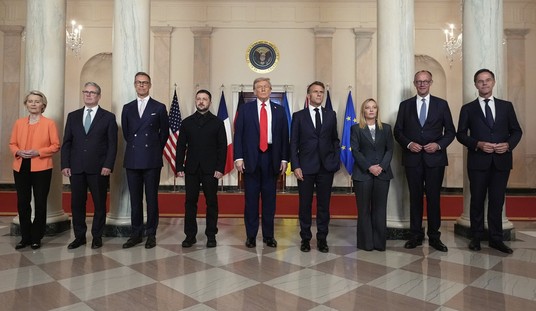One of the last giants of the victory over the Soviet Union at the end of the cold war has left us. Vaclav Havel, the author of the “Velvet Revolution” in the former Czechoslovakia in later 1989 that overthrew the Soviet-backed communist regime without a shot being fired, has passed away after a long illness, at 75 years old:
Vaclav Havel, a dissident playwright who was jailed by Communists and then went on to lead the bloodless “Velvet Revolution” and become Czech president, died at 75 on Sunday.
The former chain smoker, who survived several operations for lung cancer and a burst intestine in the late 1990s that nearly killed him and left him frail for the rest of his life, died after a long illness. He was with his wife Dagmara and a nun who had been caring for him.
“Today Vaclav Havel has left us,” his secretary, Sabina Tancevova, said in a statement.
Swedish Foreign Minister Carl Bildt said on Twitter, “Vaclav Havel was one of the greatest Europeans of our age. His voice for freedom paved way for a Europe whole and free.”
The Reuters obit is otherwise pretty useless. CBS does better, showing that Havel spent half his life crusading for freedom against communist oppression, and then leading his new nation in freedom:
Havel first made a name for himself after the 1968 Soviet-led invasion that crushed the Prague Spring reforms of Alexander Dubcek and other liberally minded communists in what was then Czechoslovakia.
Havel’s plays were banned as hard-liners installed by Moscow snuffed out every whiff of rebellion. But he continued to write, producing a series of underground essays that stand with the work of Soviet dissident Andrei Sakharov as the most incisive and eloquent analyses of what communism did to society and the individual. …
The events of August 1988 — the 20th anniversary of the Warsaw Pact invasion — first suggested that Havel and his friends might one day replace the faceless apparatchiks who jailed them.
Thousands of mostly young people marched through central Prague, yelling Havel’s name and that of the playwright’s hero, Tomas Garrigue Masaryk, the philosopher who was Czechoslovakia’s first president after it was founded in 1918.
Havel’s arrest in January 1989 at another street protest and his subsequent trial generated anger at home and abroad. Pressure for change was so strong that the communists released him again in May.
That fall, communism began to collapse across Eastern Europe, and in November the Berlin Wall fell. Eight days later, communist police brutally broke up a demonstration by thousands of Prague students.
It was the signal that Havel and his country had awaited. Within 48 hours, a broad new opposition movement was founded, and a day later, hundreds of thousands of Czechs and Slovaks took to the streets.
In three heady weeks, communist rule was broken. Mick Jagger and the Rolling Stones arrived just as the Soviet army was leaving. Posters in Prague proclaimed: “The tanks are rolling out — the Stones are rolling in.”
On Dec. 29, 1989, Havel was elected Czechoslovakia’s president by the country’s still-communist parliament. Three days later, he told the nation in a televised New Year’s address: “Out of gifted and sovereign people, the regime made us little screws in a monstrously big, rattling and stinking machine.”
In office or out, Havel served his country, Europe, and the world as a voice against totalitarianism, and especially against Russian ambitions of empire. He spoke out forcefully when Russia invaded Georgia in 2008, warning Western nations against appeasing Putin and Medvedev. Eventually, Havel returned to writing plays after having served in office in the Czech Republic and the EU for more than a decade, having also felt occasionally the ironic sting of open criticism of his performance as president — which, despite the immediate personal impact it had, must have still allowed Havel a sense of pride in having succeeded in giving all of his fellow Czechs the ability to dissent openly and choose their own leaders. After having the Soviets deny Czechs that basic right for more than 40 years, and watching Europe toss them to the Nazis in 1938 in one of modern history’s worst acts of diplomatic cowardice, that freedom had to taste sweeter than most of us will ever know.
Godspeed, Mr. Havel. You taught us that freedom matters, and that it succeeds over totalitarianism when those who love freedom do not succumb to despair. “Thank you” seems entirely insufficient.
Addendum: As commenters noted in the Headlines thread, the Nobel Peace Prize has been awarded to Barack Obama, Al Gore, and Yasser Arafat — but not to Vaclav Havel, who brought down a tyranny without ever firing a bullet. This should shower everlasting shame on the Norwegian Nobel Committee.









Join the conversation as a VIP Member